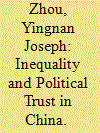| Srl | Item |
| 1 |
ID:
167029


|
|
|
|
|
| Summary/Abstract |
This paper investigates energy transition, energy poverty and energy inequality in Vietnam employing a longitudinal dataset of a nationally representative household survey. We use the data on residential energy expenditure of more than 9,000 households over the period 2004–2016. We find a transition from traditional energy to modern energy but this transition varies across regions, between ethnic and welfare groups and between rural and urban population. The poor and ethnic minority households still rely heavily on traditional energy sources such as coal and biomass to meet their energy demands. Electricity poverty has decreased but energy-cost poverty has increased. In addition, energy inequality tends to decrease at a more significant rate than income and consumption inequalities. We propose a national program for energy poverty alleviation be established to devise policies to lower households’ energy costs. Further assistance to the poor and ethnic minority households is also recommended so that they can afford a higher level of electricity consumption.
|
|
|
|
|
|
|
|
|
|
|
|
|
|
|
|
| 2 |
ID:
167069


|
|
|
|
|
| Summary/Abstract |
The social volcano thesis states that the rising inequality in China threatens regime stability. This idea, although widely held in the media and in academia, is backed by little positive evidence but by much negative evidence. Two primary pieces of negative evidence are that the Chinese people trust the central government and that they are highly tolerant of inequality. This paper discusses the shortcomings of the negative evidence and re-examines the thesis in a rigorous and direct way. Our multilevel analysis shows that provincial inequality has negative effects on individuals’ trust in the local government but not in the central government, and this negative effect holds for both the rich and the poor. Because distrust in the local government implies distrust in the central government, we conclude that a social volcano exists.
|
|
|
|
|
|
|
|
|
|
|
|
|
|
|
|
| 3 |
ID:
105861


|
|
|
|
|
| Publication |
2011.
|
| Summary/Abstract |
Britain urgently needs a national conversation about the economic, political and moral predicament it now faces. It should start with the economic crisis of 2008-09. Keynesians and neoliberals alike still seek to return to pre-crisis business as usual, albeit with modifications. But the untamed capitalism that came to grief in 2008 had three major flaws. First, it undermined the public domain of equity, citizenship and civic virtue, whose creation was one of the great achievements of the late-nineteenth and early-twentieth centuries, exposing it to invasion by the market domain. Second, it led to a remorseless rise in inequality of resources and life chances, rendering British society one of the most dysfunctional in Europe. Third, it encouraged the emergence of a debased form of democracy, best called 'market populism', that mocks the dream of political equality that lies at the heart of the democratic ideal. Yet growth points of a better society can be detected amidst the gloom. Informal institutions and social movements like London Citizens and the burgeoning environmental movement show that the notion of the public good is still alive. So do the survival of Edmund Burke's communitarianism in the conservative tradition, of John Stuart Mill's social liberalism in the liberal tradition and of ethical socialism in the social-democratic tradition.
|
|
|
|
|
|
|
|
|
|
|
|
|
|
|
|